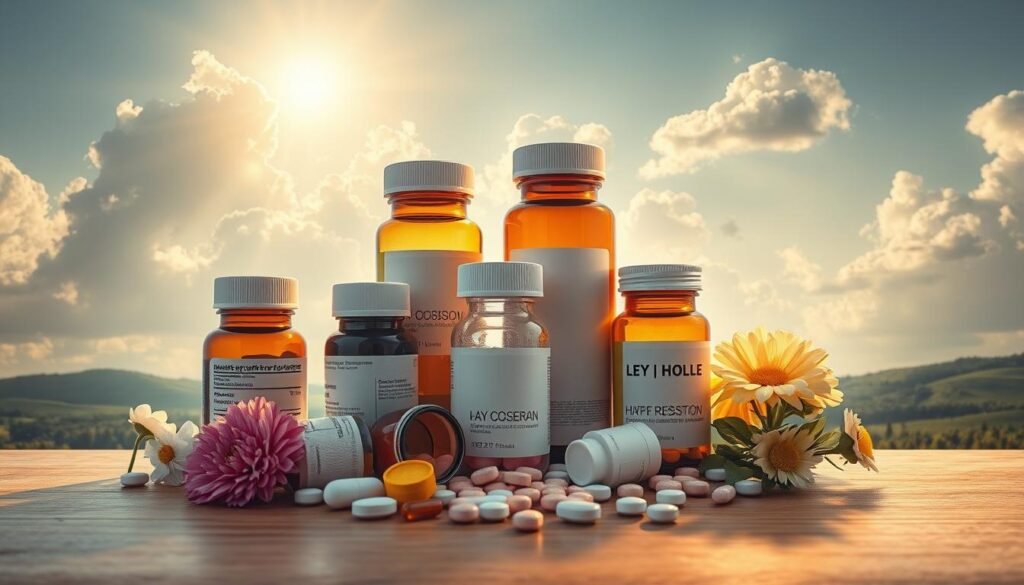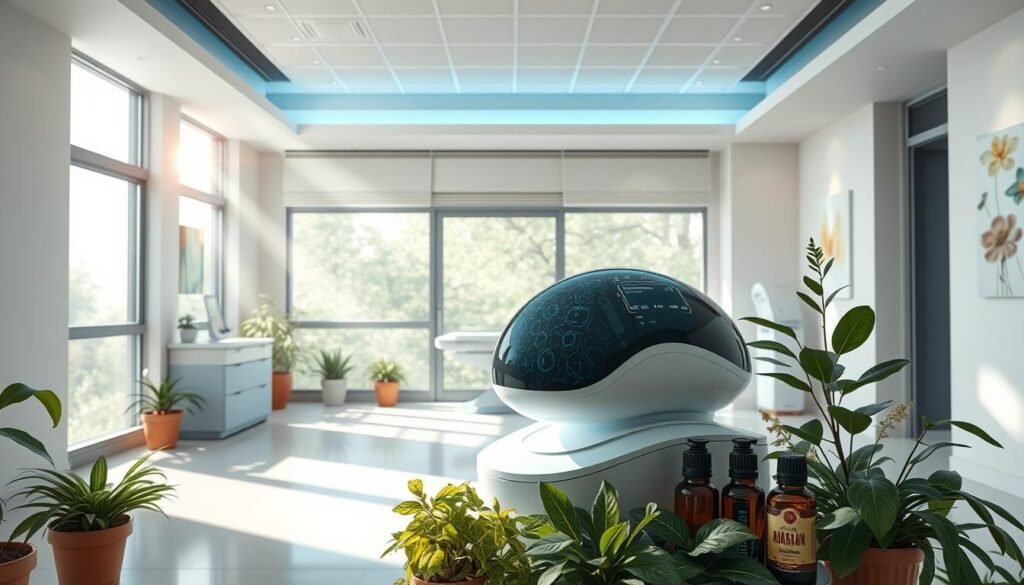Did you know about 30% of people with major depressive disorder have treatment resistant depression (TRD)? This tough kind of depression doesn’t easily get better with normal treatments like meds or talking to therapists. Lots of folks might try many methods before they find one that really helps with their depression. This piece will explore the struggles, symptoms, and stories of those with TRD. It will also look into more advanced treatments. If you’re looking for help and hope, understanding TRD is key.
Key Takeaways
- Treatment resistant depression affects 30% of patients with major depressive disorder.
- It may take trials of multiple antidepressants before finding an effective remedy.
- Ketamine and esketamine are showing promise for hard-to-treat depressive symptoms.
- Combining psychological counseling with medication can enhance treatment outcomes.
- Electroconvulsive therapy (ECT) can provide rapid relief but may carry side effects.
- Managing lifestyle factors is important in the overall strategy for overcoming TRD.
Understanding Treatment Resistant Depression
Treatment resistant depression (TRD) is hard to manage and doesn’t improve with common treatments. Many people try at least two antidepressants without success. Up to 30% of those with depression face this challenge, making it a serious issue.
Experts differ on what counts as TRD. Some look at how many treatments failed, while others check how long and severe the depression is. The FDA and EMA use a clear definition. It is about not getting better after trying two different antidepressants.
TRD affects over 100 million people around the world. It shows how widespread this problem is. It also causes over half of the costs linked to Major Depressive Disorder. This shows the huge economic strain it places on society.
People with TRD face many problems. They use more healthcare services and need stronger treatments. Their daily life and social functions are heavily impacted. They might end up using disability benefits more and have a higher risk of suicide. They are also at risk for diseases like heart disease and diabetes.
There’s no one way to define TRD in medical guidelines. This leads to different treatment plans in different places. It makes it hard for research and for patients to get the right help. This inconsistency affects those suffering from TRD the most.
To really get TRD, we need to see its full impact on people and healthcare. We need tailored treatment plans for each person. This approach can better address the unique challenges of TRD.
Symptoms of Treatment Resistant Depression
Treatment resistant depression can make everyday life very hard. Symptoms can be from just uncomfortable to deeply painful. They affect both the mind and body.
Here are some common symptoms:
- Persistent sadness: A deep feeling of sorrow that stays with you.
- Fatigue: Feeling tired all the time, making even small tasks hard.
- Changes in sleep patterns: This includes too much sleep or not enough, messing up your rest.
- Difficulties concentrating: Having trouble staying focused and making decisions.
- Loss of interest: Not finding joy in things you used to love.
- Feelings of hopelessness: Feeling like things won’t get better.
- Irritability: Getting easily upset and having a hard time dealing with stress.
For those with tough-to-treat depression, symptoms can create a frustrating loop. About 30% to 40% of people only see some symptoms go away with antidepressants. And 10% to 15% don’t get better with these medicines at all.
Knowing these signs is key to managing depression that doesn’t respond to usual treatments. Doctors think about treatment resistance after two different antidepressants don’t help much.
| Symptoms | Description |
|---|---|
| Persistent sadness | A strong, long-lasting sadness that affects how you feel overall. |
| Fatigue | A constant tiredness that stops you from doing everyday things. |
| Sleep disturbances | Having a hard time sleeping properly, whether too much or too little. |
| Concentration issues | Struggling to keep focused or make choices. |
| Hopelessness | Feeling like things won’t improve. |
These symptoms show the complex nature of treatment resistant depression. They stress the need for careful and complete assessments to find the right treatments.
Who is Affected by Treatment Resistant Depression?
Treatment resistant depression (TRD) affects a big part of the community. About 30% of people with major depression face this challenge. It often affects young adults, a key time for spotting and treating such depression.
TRD can really impact someone’s life, including their relationships and work. It needs a plan made just for them. By understanding each person’s needs, recovery becomes more likely.
People react differently to treatments. An inadequate response is seen when symptoms drop by less than 25%. The effectiveness of changing medicines varies widely, making it hard for many to find relief. This shows how varied TRD experiences can be.
Some treatments like lithium add-on therapy help more than others, with a 41.2% success rate. New treatments like FDA-approved Spravato show progress in treating hard-to-treat depression.
Raising awareness about TRD is key. It encourages people to get help. Working with knowledgeable professionals leads to better care and results.
| Condition | Prevalence | Response Rate | Remission Rate with Lithium Augmentation |
|---|---|---|---|
| Treatment Resistant Depression | 30% of Major Depressive Disorder Patients | 25% – 70% for Antidepressant Switch | 41.2% with Lithium, 14.4% with Placebo |
| Persistent Depressive Disorder | Varies by Demographic | N/A | N/A |
| Difficult-to-Treat Depression | Common in Multiple Demographics | Low Response in Standard Treatments | N/A |
Diagnosing Treatment Resistant Depression
To find out if someone has treatment resistant depression, doctors look at the person’s health history. They examine previous treatments like medications and therapy to see how the patient reacted. It’s important to notice symptom patterns because 10–15% of people don’t get better with antidepressants.
Doctors think about many things when they tackle hard-to-treat depression. They check if patients are following their treatment plans and look for other health problems. Psychiatrists also dig into life events and the patient’s full medical history to understand their difficulties better.
Figuring out if depression won’t respond to treatment usually means trying two or more types of antidepressants. Each drug needs about 6 to 8 weeks to work before doctors try something else.
Understanding why some depressions are hard to treat is complex. Things like genes, metabolic issues, and wrong diagnoses play a big role. As science moves forward, doctors are getting into personalized medicine. This could help them find better ways to help people with this tough type of depression.
Challenges of Managing Treatment Resistant Depression
Managing treatment resistant depression has many challenges. More than 30% of chronic depression patients don’t find relief with their first treatments. They often feel hopeless after trying many therapies without good results.
The stigma around depression makes it hard to talk about treatment. People may hesitate to share their struggles or look for new treatments. This adds another hurdle in managing treatment resistant depression well.
Every patient’s biology adds to the treatment challenges. Standard antidepressants don’t always work, limiting recovery options for some. It’s crucial to have innovative strategies and a personalized approach. For deep insights, check out recent research and expert advice.
| Challenges Faced | Description |
|---|---|
| Frustration with Treatment | Patients often cycle through regimens without relief. |
| Stigma | Hinders conversations about treatment effectiveness. |
| Biological Complexities | Variability in individual responses to traditional antidepressants. |
| Limited Options | Some patients may find few suitable therapies for recovery. |
| Need for Innovative Strategies | Research insists on tailored approaches for effective management. |
Medication Strategies for Treatment Resistant Depression
Treating depression that’s hard to cure can be tough. Different medicines work better for some than others. Doctors and patients need to work closely to find the best medicine plan.
Adjusting Medication Dosages
Sometimes, people need higher doses of medicine than usual to feel better. It’s crucial to figure out the right dose. This is because it takes about six to eight weeks for antidepressants to work best. Getting the dose right can make a big difference.
Switching Antidepressants
Often, changing medicines is part of treating stubborn depression. Since the first medicine doesn’t always work, trying a new one may help. It may take trying up to four different medicines to see improvement. Changing drugs can increase the chances of getting better.
Combination Therapy Approaches
Using several medicines together can be more effective. This method targets multiple brain signals involved in mood. It can make people feel much better compared to using just one medicine.
A well-rounded treatment plan is key. It involves adjusting medicines and adding other types of therapy. This approach can help people in their fight against depression. For more on natural treatments, click here.

| Strategy | Effectiveness | Description |
|---|---|---|
| Adjusting Dosages | Variable | Increases the dosage of current medication to enhance therapeutic effects. |
| Switching Antidepressants | Moderate | Changing to a different antidepressant if the current one is ineffective. |
| Combination Therapy | Potentially High | Using multiple medications simultaneously for a broader treatment effect. |
Psychological Counseling for Treatment Resistant Depression
Psychological counseling is key in treating tough depression cases. Many people try medications without success. Adding therapy can bring big improvements. Therapies like Cognitive Behavioral Therapy (CBT) and Dialectical Behavioral Therapy (DBT) teach coping skills. They’re proven to help and are part of complete care plans.
Cognitive Behavioral Therapy
Cognitive Behavioral Therapy changes harmful thinking. It’s proven to help those with hard-to-treat depression. CBT improves feelings and encourages good behaviors. It cuts down lingering depression symptoms and makes life better.
Dialectical Behavioral Therapy
Dialectical Behavioral Therapy helps with controlling emotions. It’s great for those who often feel suicidal. DBT makes it easier to understand feelings and relationships. This leads to healthier ways of interacting and less guilt.
Other Therapeutic Approaches
Other therapies can also help those with tough depression. They include:
- Mindfulness-Based Cognitive Therapy: Increases emotional awareness and acceptance.
- Behavioral Activation: Pushes patients to do positive things and feel better.
- Interpersonal Therapy: Improves how to relate to others and express feelings.
- Short-Term Psychodynamic Therapy: Deals with deep-seated emotional issues.
Adding these therapies to treatment can enhance its success. Research supports using them together with meds. This approach works better than meds alone.
| Therapy Type | Focus Area | Efficacy in TRD |
|---|---|---|
| Cognitive Behavioral Therapy | Negative thought patterns | High |
| Dialectical Behavioral Therapy | Emotional regulation | Moderate |
| Mindfulness-Based Cognitive Therapy | Emotional awareness | High |
| Behavioral Activation | Engaging in positive activities | Moderate |
| Interpersonal Therapy | Relationships and social skills | Moderate |
| Short-Term Psychodynamic Therapy | Emotional conflicts | Emerging |
Psychotherapy is a top choice for depression. People with resistant depression should talk to their doctors about it. Working together on treatment plans leads to better health and happier lives.
Advanced Treatment Options for Treatment Resistant Depression
Treatment-resistant depression (TRD) can be tough to manage. But, new advanced treatments offer hope. We will look into innovative therapies available now.
Transcranial Magnetic Stimulation (TMS)
Transcranial Magnetic Stimulation (TMS) is a non-invasive method. It uses magnetic fields to stimulate the brain’s nerve cells. This aims to reduce depression symptoms. Studies show TMS is effective, mainly for those who didn’t benefit from medications.
Ketamine and Esketamine Therapy
Ketamine and esketamine provide quick relief from depression. Esketamine comes as a nasal spray, making it easy to use. These treatments boost glutamate levels in the brain, impacting more brain cells. They work fast, which is crucial for severe depression.
Check out these advanced treatments for treatment resistant depression.
Electroconvulsive Therapy (ECT)
Electroconvulsive Therapy (ECT) is a proven option for major depression. It sends a small electric current through the brain. This changes brain chemistry and decreases symptoms fast. ECT is especially for those who have tried everything else.

The way we treat TRD is changing. These advanced treatments offer different approaches for relief. As we discover more, even more options may become available. This gives hope and more choices for those working to improve their mental health.
Supportive Strategies Beyond Medication
Supportive strategies for tackling treatment-resistant depression (TRD) are crucial in its all-around management. Around 30% of Major Depressive Disorder (MDD) patients find that regular antidepressants don’t work for them.
Adopting a holistic approach can greatly improve outcomes. Getting regular exercise is key, not just for the body, but also for easing TRD symptoms. It’s also important to sleep well and eat right. These habits build emotional strength.
Having emotional support matters just as much. Building strong social ties helps people share their stories and boosts mental health. Support from family or peer groups gives the necessary emotional lift. Approaches that don’t rely on medication make people feel less alone in their fight.
Educating patients about their condition empowers them. Knowing more about TRD and sticking to treatment plans reduces the chance of getting worse. This knowledge lets patients make smart choices and take an active role in their recovery.
Combining these supportive strategies can build resilience and give hope to those battling TRD. Many of these lifestyle changes work well with professional treatments, like ketamine infusion therapy. Centers like Ascend Health Center understand the value of a holistic approach. They provide customized programs to help people on their recovery journey.
| Supportive Strategy | Benefits |
|---|---|
| Regular Physical Activity | Improves mood, reduces anxiety |
| Healthy Diet | Supports overall mental and physical health |
| Quality Sleep | Enhances cognitive function, reduces irritability |
| Stress Management Techniques | Helps in emotional regulation and coping |
| Strong Support Networks | Provides emotional support and reduces feelings of isolation |
| Psychoeducation | Empowers individuals with knowledge for better treatment adherence |
Finding Hope in Treatment Resistant Depression
Hope for treatment resistant depression (TRD) is about seeing the chance to get better through various methods. Those with TRD can take comfort in knowing more about this difficult condition. They might find new ways to feel well by looking into the latest therapy innovations.

Being active in your treatment plan is key. Support from others can offer much-needed help with TRD. Talking with family, friends, or groups brings a feeling of togetherness that helps healing.
- Seeking TRD support resources helps people share their stories and find ways to cope.
- Trying newer treatments like TMS or ketamine therapy might bring good changes.
- Adding mindfulness and changing daily habits can boost one’s overall mood.
Mental health experts suggest looking at treatment resistance as a specific obstacle, not as defeat. They create treatment plans that respect each person’s unique background, including genetics and life experiences.
Pushing for more research and better understanding of TRD is vital. As awareness grows, people can feel stronger and more hopeful on their path to wellness.
Conclusion
Treatment-resistant depression (TRD) is a tough challenge for both patients and healthcare providers. It’s key to know the condition, spot the symptoms, and look at various treatments. This includes changing meds, therapy, and new methods. Despite feeling stuck, there are real ways to get better with the right tactics.
About 20% of those with major depressive disorder don’t get better with standard treatments. This shows we need new ideas. The STAR*D trial proved that each new drug trial could lessen the chance of getting better. This tells us it’s vital to keep seeking new knowledge on TRD to help patients more.
Even with hard times, hope is still strong. Working together – patients, families, and doctors can lead to progress in dealing with TRD. The tough parts of facing treatment-resistant depression also show us ways to learn and heal. This ensures no one feels alone in their fight against this hard illness.